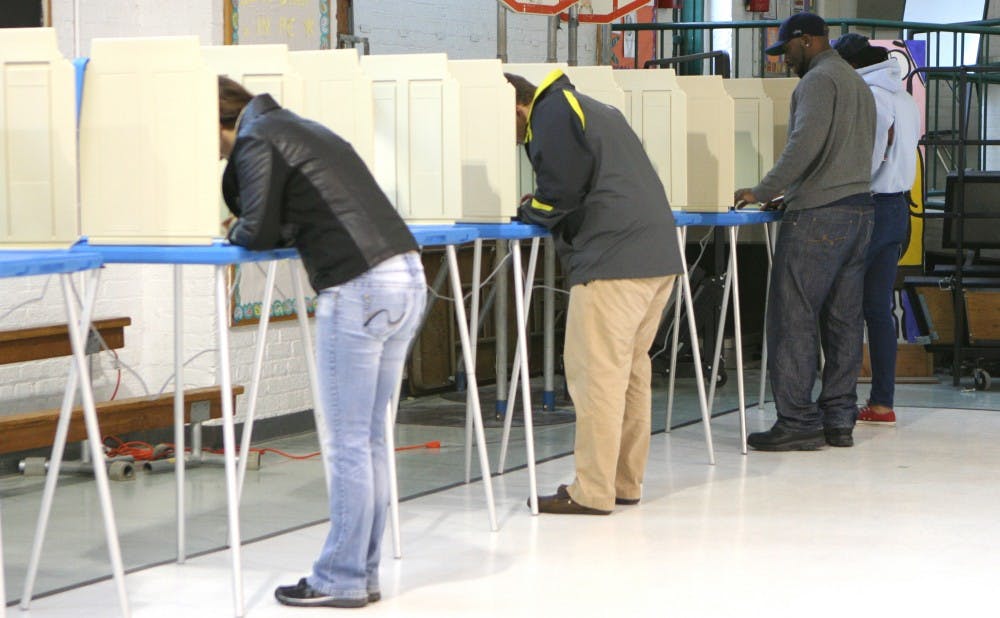A report showing potential evidence of voter fraud in North Carolina is fueling new flames in the debate over mandatory voter identification.
Last week the North Carolina State Board of Elections presented a report with evidence that more than 35,000 people who voted in the N.C. 2012 general election had the same name and birthdate as voters registered in another state. There were also 765 voters who matched social security numbers in addition to first and last names and birth date with someone who voted in another state. The Interstate Voter Registration Crosscheck program conducted the report, which was presented to the Joint Legislative elections Oversight Committee. Some point to these new findings as justification for the controversial law passed last summer requiring voters to register with a photo ID.
"This is a revelation for North Carolina,” said Susan Myrick, election policy analyst at the North Carolina Civitas Institute. “This helps put a little bit of light on the possibility that [fraud] is happening.”
Some legislators are citing the report as evidence of the need for stricter voter ID laws.
“We are encouraged to see the common-sense law passed to ensure voters are who they say they are is working,” said Thom Tillis, speaker of theOthers, however, doubt that the data has serious implications and say that it does not accurately reflect the amount of fraud occurring.
“Just because your name matches [that of another person] doesn’t mean it’s the same person,” said Jennifer Frye, associate director of Democracy North Carolina. “That doesn’t automatically mean there’s voter fraud.”
Frye said the office of the Kansas Secretary of State, which is responsible for the Crosscheck program, has not provided evidence that anyone has been legally charged as a result of the matching information. Frye also argued that some people simply share the same name and birthday or could be listed twice as a result of slow registrar processing.
“There are all kinds of reasons people might have filled out multiple registrations,” said John Aldrich, Pfizer-Pratt University Professor of Political Science. “It’s possible that there’s lots and lots of overlap, so we have reason to be suspicious [of the numbers].”
The constant flow of people traveling through North Carolina, South Carolina and Virginia for work or between multiple residences could account for some of the instances of double voting, Myrick said, as well as various complexities in registration processes and databases.
Aldrich explained that people are not individually responsible for removing their names from voting registration lists when they change residences or move across state borders. If the state does not remove them, they may remain incorrectly on a registration list. Also, redistricting could change the county in which people are registered to vote without the residents physically relocating.
Requiring voters to show a photo identification would not necessarily prevent people from voting illegally in two different states, Myrick said. However, it would prevent people from taking on others’ identities and voting for them.
“Absolutely voter ID will help in [identifying] that kind of fraud and definitely has a role to play,” she said.
Last week's data release by the state board is the first instance in which North Carolina has looked into voting fraud in this capacity. Myrick noted that a state's decision to partake in the Crosscheck program is entirely voluntary. Twenty-eight states’ voting records have been reviewed so far, but notable omissions are the those of the four most populous in the country—California, New York, Texas and Florida.
Until the new data is further investigated and attempts are made to prosecute people who have voted illegally, it will not be clear what is and what is not definite fraud out of these numbers, Aldrich said.
“This is just the beginning of the research,” Myrick said. “The next step for the state board is to step in and say, what other data can you give me on this?”
Further investigation will take a long time in order to come to more conclusive evidence of fraud, but the numbers given so far are grounds for suspicion, Myrick said.
Aldrich also said he would be surprised if more than 3,000 of the 35,570 potential cases were actually fraudulent in some way, and voter ID requirements would do little to curb the fraud already happening. Individual lawbreakers are few and far between, and people who intend to act illegally will just work around any further restrictions that are put into place, he said.
Additionally, Aldrich argued that individual instances of voter fraud are rare and are usually organized on a much larger scale, such as when coordinated by political parties or super PACs.
“It is parties who organize fraud,” he said. “That's always been the case.”
Get The Chronicle straight to your inbox
Signup for our weekly newsletter. Cancel at any time.

